



Speaking during a press conference in the capital, Nuku’alofa, Mr. Guterres called for world leaders to drastically slash global emissions, quickly phase out fossil fuels, and massively boost climate adaptation investments to protect people from current and future risks.
“This is a crazy situation: rising seas are a crisis entirely of humanity’s making. A crisis that will soon swell to an almost unimaginable scale, with no lifeboat to take us back to safety,” he warned. “But if we save the Pacific, we also save ourselves. The world must act and answer the SOS before it is too late.”
Boost Investment
Unprecedented sea level rise ]
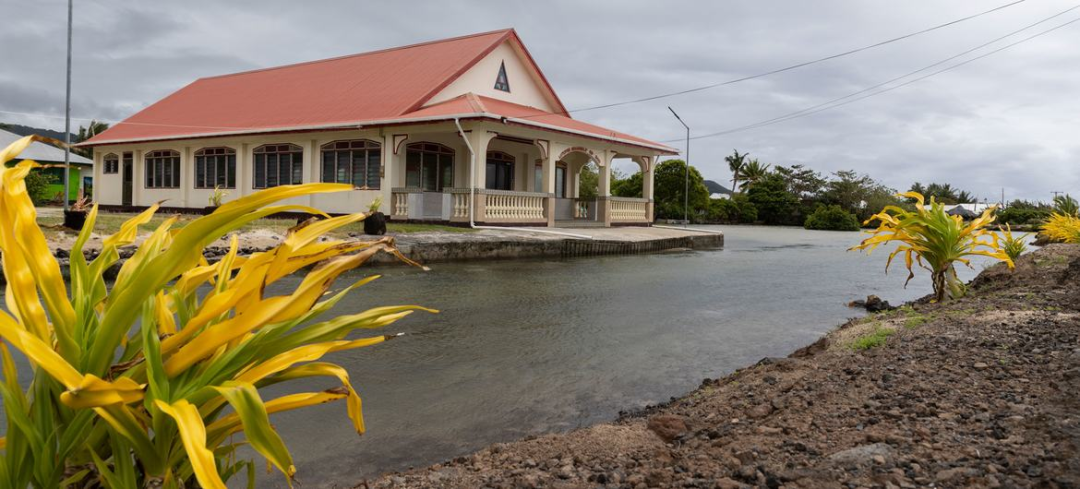
The UN chief said global average sea levels are rising at rates unprecedented in the past 3,000 years.
“The reason is clear: greenhouse gases – overwhelmingly generated by burning fossil fuels – are cooking our planet. And the sea is taking the heat – literally,” he continued.
Seas have absorbed more than 90 per cent of global heating in the past five decades. Water expands when it gets hotter, and melting glaciers and ice sheets have added to the sea’s volume, thus causing the ocean to overflow.
Ocean changes accelerating
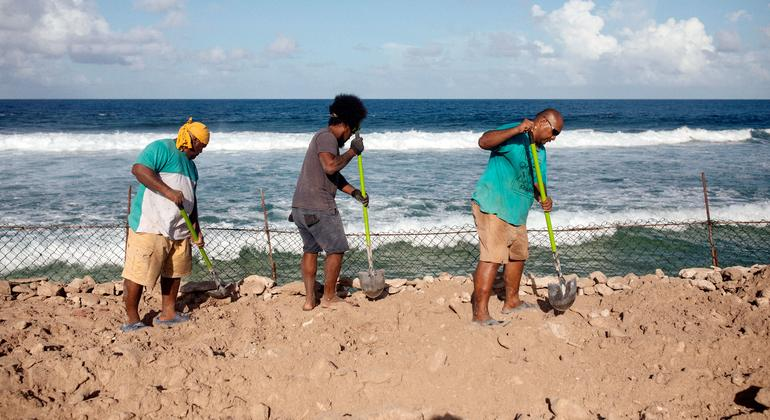
Meanwhile, two UN papers published that day “throw the situation into sharp relief”, he said.
The study by the World Meteorological Organization (WMO) on the State of the Climate in the South West Pacific, alongside a report by the UN Climate Action Team on Surging seas in a warming world, “show that changes to the ocean are accelerating, with devastating impacts.”
Together, they outline how monthly sea temperatures continue to shatter records. At the same time, marine heatwaves have become more intense and longer lasting, doubling in frequency since 1980, while rising seas are amplifying the frequency and severity of storm surges and coastal flooding.
Pacific islands ‘uniquely exposed’
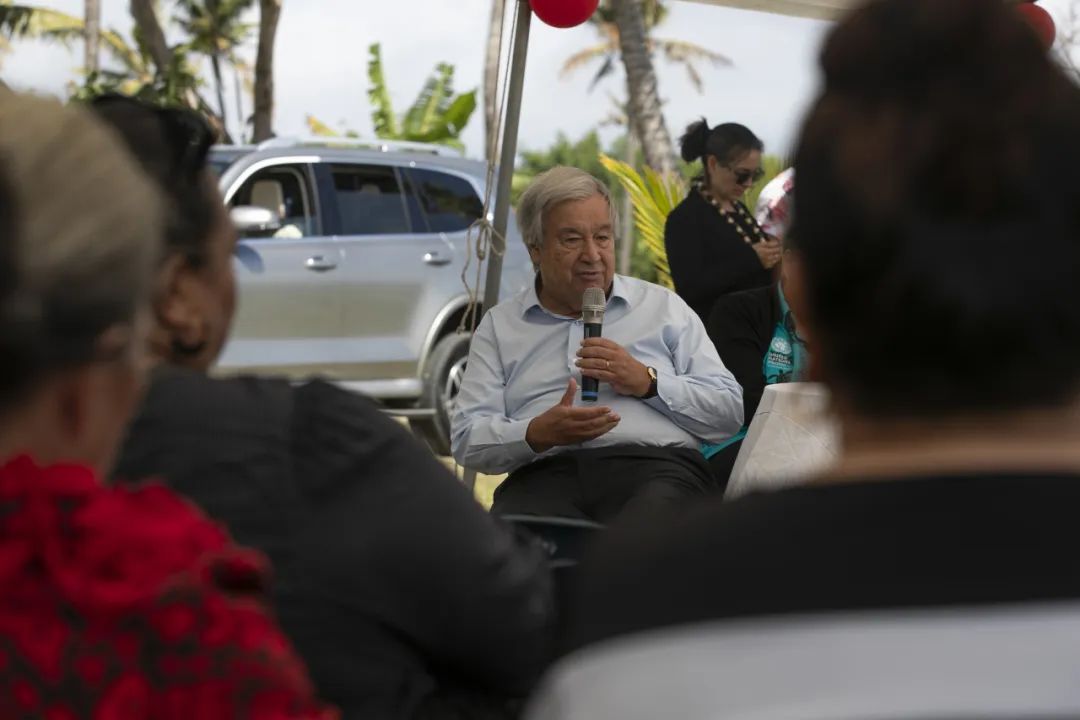
“Today’s reports confirm that relative sea levels in the Southwestern Pacific have risen even more than the global average–in some locations, by more than double the global increase in the past 30 years,” the Secretary-General said.
He explained that “Pacific islands are uniquely exposed” as average elevation is just one to two meters above sea level, around 90 per cent of people live within five kilometres of the coast, and half of all infrastructure is within 500 metres of the shoreline.
“Without drastic cuts to emissions, the Pacific Islands can expect at least 15 centimetres of additional sea level rise by mid-century, and more than 30 days per year of coastal flooding in some places,” he said.
The reports revealed that the average rate of sea level rise has more than doubled since the 1990s, indicating that “the phenomenon is accelerating in an unusual and uncontrolled way.”
While global-mean sea level has risen over 10 centimetres since 1993, the situation is even worse in the Pacific, where some locations exceed 15 centimetres.
He pointed to emerging science, which suggests that a rise in global temperature by two degrees Celsius over pre-industrial levels could potentially lead to the collapse of both the Greenland and West Antarctica ice sheets, essentially “condemning future generations to unstoppable sea level rise of up to 20 metres - over a period of millennia.”
Surging seas are coming for us all
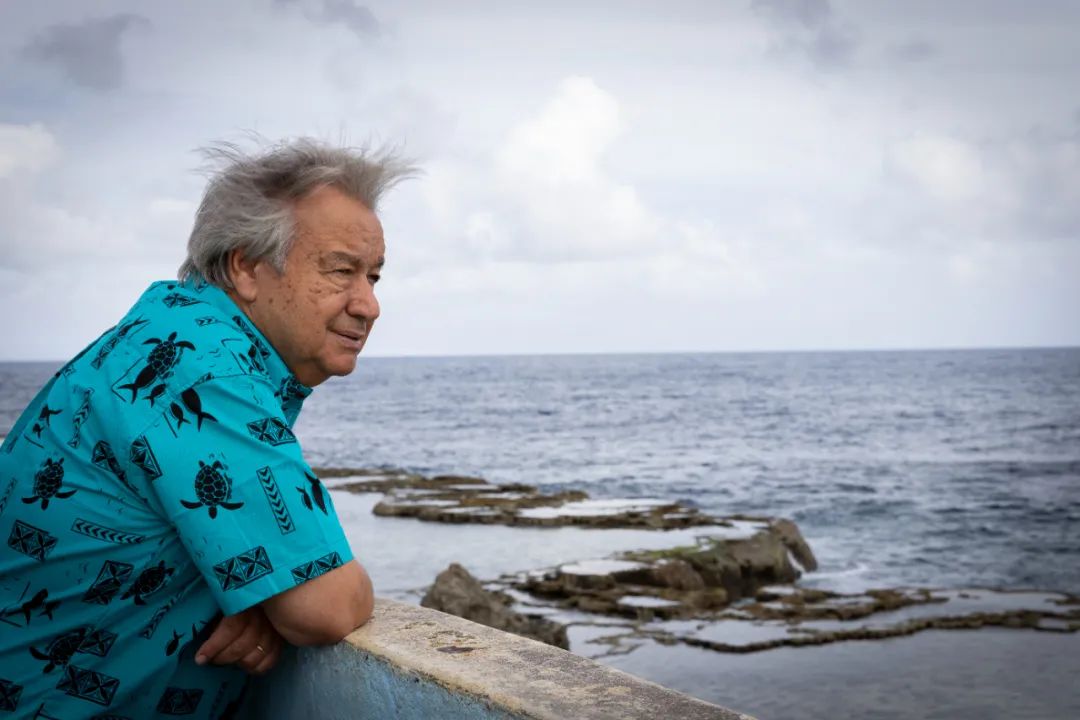
The world is currently on a trajectory towards a three-degree temperature rise above pre-industrial levels, meaning that sea level rise would happen much more quickly, spelling disaster for Tonga and beyond.
“Surging seas are coming for us all – together with the devastation of fishing, tourism, and the Blue Economy,” the Secretary-General said.
He recalled that roughly a billion people worldwide live in coastal areas, which includes “coastal megacities” such as the Bangladeshi capital, Dhaka; Los Angeles in the United States; Mumbai, India; Lagos, Nigeria, and Shanghai, China.
Rising seas will increase the frequency of coastal floods and other extreme events, he said, and a 2.5-degree temperature rise could increase the rate from once in 100 years to once in five years by the end of the century.
Without new adaptation and protection measures, the economic damage could amount to trillions of dollars, he added, urging world leaders to step up now.
Reduce global emissions
Mr. Guterres stressed the need to limit global temperature rise to 1.5℃, which means “cutting global emissions 43 percent compared to 2019 levels by 2030, and 60 percent by 2035.”
He called for governments to deliver new national climate action plans, known as Nationally Determined Contributions (NDCs), by 2025, as promised at the UN COP28 climate conference in Dubai last year.
Leaders must also put the world on track to phase out fossil fuels fast and fairly, including ending new coal projects as well as new oil and gas expansion, he continued. This is in addition to their commitment to triple renewables capacity, double energy efficiency and end deforestation by 2030.
Support vulnerable countries
The Secretary-General again repeated his long-standing appeal for G20 nations, “the biggest emitters”, to take a leading role in these efforts.
“And the world must massively increase finance and support for vulnerable countries. We need a surge in funds to deal with surging seas,” he said.
Looking ahead to this year’s UN climate conference, he urged countries to “boost innovative financing”. Richer nations must also deliver on their commitments, which include doubling adaptation finance to at least $40 billion annually by 2025.
Addressing climate justice, he also highlighted the need for “significant contributions” to be made to the new Loss and Damage Fund so as to support the Pacific islands and other vulnerable countries. The same also applies to initiatives announced during the latest Pacific Islands Forum, which opened in Tonga on Monday.
“Finally, we need to protect every person on Earth with an early warning system by 2027,” he said. “That means building up countries’ data capacities to improve decision-making on adaptation and coastal planning.”
Mr. Guterres first announced the Early Warnings for All initiative in March 2022, which calls for ensuring that these lifesaving systems are in place across the planet by the end of 2027.
Leadership of Pacific Islands
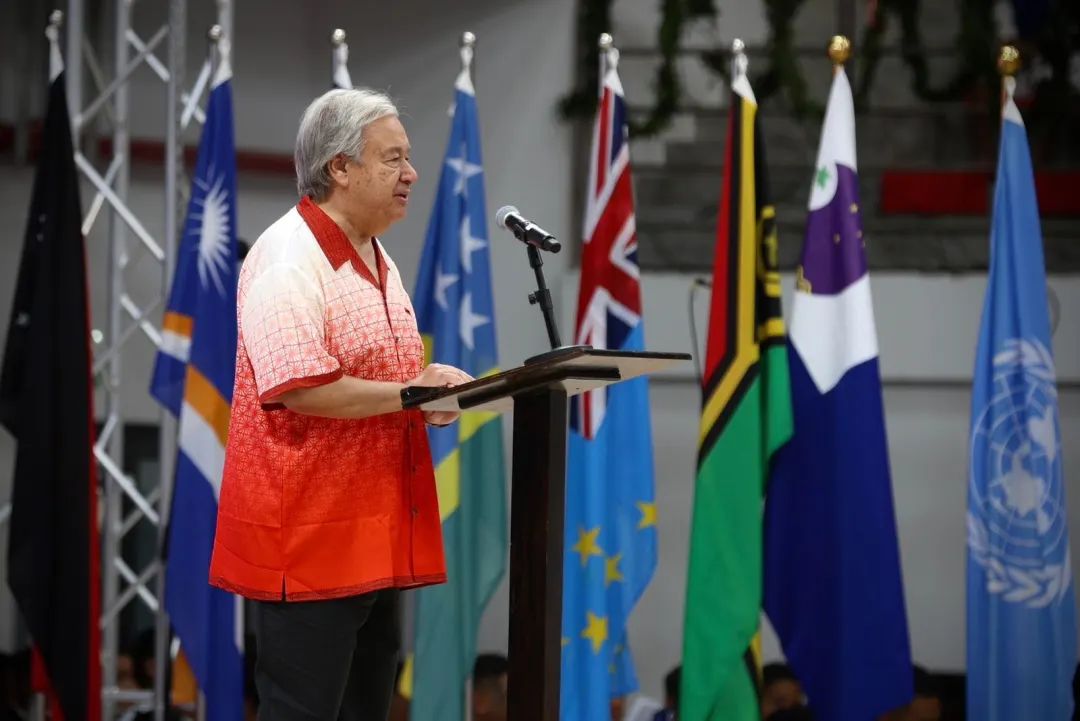
Secretary-General António Guterres was addressing the 53rd Pacific Islands Forum that “if we save the Pacific, we save the world. Pacific Island States have a moral and practical imperative to take your leadership to the global stage.” Pacific Islands need to show the way to protect our climate, our planet and our ocean.
Guterres pointed out that much of the world is embroiled in conflict, injustice and socio-economic crisis, the global 2030 Agenda for Sustainable Development is faltering.
“The Pacific“ is a beacon of solidarity and strength. The world has much to learn from Pacific Islands” especially in how to protect our climate, our planet and our ocean, he declared.
Make the voice of PIC heard
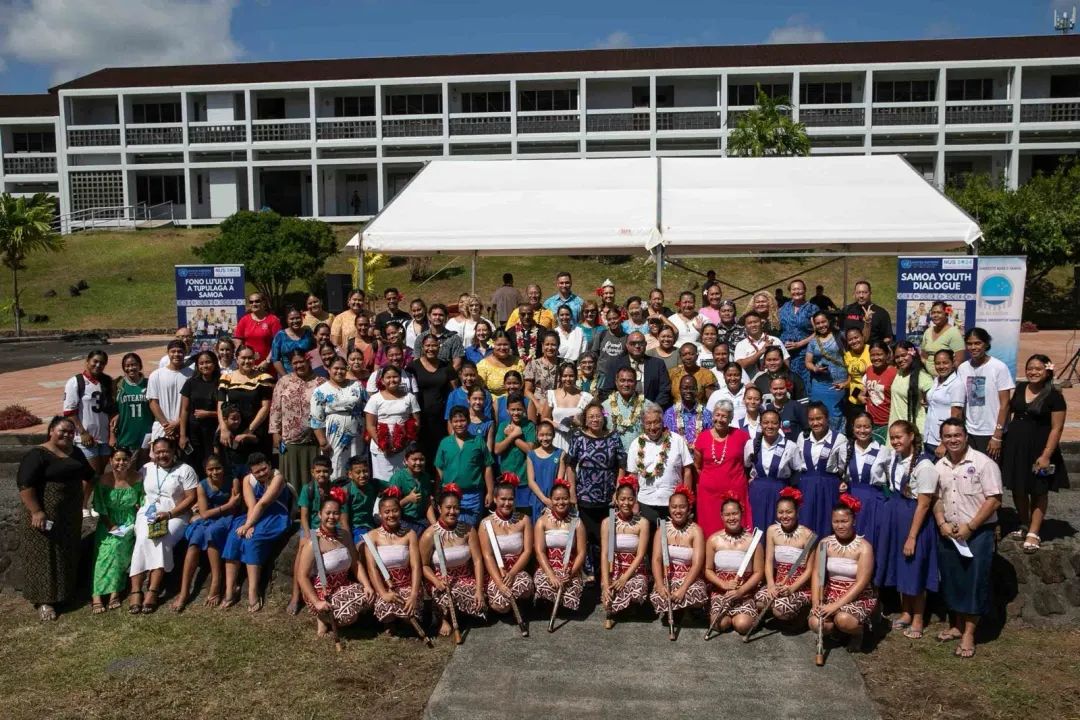
01 Initiative to support Pacific Islands
The ocean worldwide is being treated “like a sewer” by humanity at large. “Plastic pollution is choking sealife. Greenhouse gases are causing ocean heating, acidification and rising seas”, he declared.
He pointed to the region’s Declarations on Sea Level Rise, and determination to have a just transition towards a fossil-fuel-free Pacific. People have also rightly recognized that this is a security crisis and taken steps to manage those risks together.
He “wants to express my full support to the 2050 Strategy for the Blue Pacific Continent, and I will do my best to help mobilize international resources for the Pacific Resilience Facility and to engage with all the relevant initiatives the Pacific Island Forum.”
He said that the world “must also step up to support you.”
02 Fair and just transition for survival
While at the forum, Guterres repeatedly urged richer nations to ramp up efforts to establishing a just transition for the phaseout of the fossil fuels that are responsible for 85 per cent of the emissions of greenhouse gases.
He stressed that all countries must produce national climate plans–Nationally Determined Contributions–by next year, aligning with the 1.5-degree upper limit of global heating. The G20, which he noted are responsible for 80% of emissions, “must step up and lead, by phasing out the production and consumption of fossil fuels and stopping their expansion immediately”, said the UN Secretary-General.
03 Calling for reform of the international financial architecture
He stressed that The Pacific Island states’ ambition for a fossil-fuel-free Pacific is a blueprint for the G20 and for the world. However, the region urgently needs more financial support, capacities and technology to speed up the transition to clean energy and so countries can invest in adaptation and resilience.
“That is why we have been calling for reform of the international financial architecture, a massive increase in the lending capacity of Multilateral Development Banks, debt relief programmes that work, and an enhanced redistribution of Special Drawing Rights, to benefit developing countries”, the UN chief added.
04 Raise the voice of developing countries
The leadership of the small island countries is demonstrated once again with the General Assembly’s endorsement of the Multidimensional Vulnerability Index. We must now make sure that international financial institutions include them in their criteria for operations.
Mr. Guterres stressed that the Summit of the Future in New York next month will be an opportunity to reform and update global institutions, so they can again be fit for purpose.
“I urge Pacific Island States to make your voices heard and heard loudly because the world needs your leadership”, the UN chief concluded.
Secretary-General António Guterres visit Samoa in early days. Like many Pacific countries, Samoa is caught in a storm of rising prices, rising seas, and rising geopolitical tensions. These challenges can only be addressed if international lenders agree to fairer terms for key development finances, and the world’s largest polluter significantly increases its contributions to tackle “climate chaos”.
He pointed out that people in Pacific Island Countries refused to be victims of climate change. However, due to the lack of funds has put ambitious plans for climate action and sustainable development on hold.
He expressed that “we are fighting hard for climate justice, but we are not seeing the money that is needed. And that’s why we ask for the reform and the international financial institutions in order for the funding needs of countries, like Pacific countries, to be met.”
More than commitment
Guterres said that the positive attitude of rich countries towards developing countries is not enough to compensate for the economic impact of natural disasters caused by climate change. He pointed to the Loss and Damage Fund, agreed to in 2022 at the U.N. Climate Change Conference (COP27) in Egypt.
He pointed out that rich countries pledge to double climate adaptation funding to $200 billion. But that promise is broken.
“And we need all countries to honour their promises on climate finance, and a strong finance outcome from this year’s COP where we will discuss the financial commitments after 2025. ”
Sea walls are in danger
Guterres recalled how people from Samoa fight against the climate change, including the tsunami that killed at least 192 people in 2009.
He said that “we have seen people that moved their houses inland. We have seen people that persisted coming back and rebuilding. We have seen an enormous determination of people to fight against, not only the impact of the tsunami, but the impacts of the rising sea levels and of the storms and the cyclones.”
“That wall in 20 years, because of the tsunami, because of the rising sea level, and because of the heavy storms, has already been built three times.”
Structural inequalities in international finance
Many developing countries like Samoa are on the front lines of the climate crisis. They have to borrow from international financial institutions at interest rates higher than those of the world’s poorest countries, which actually hinders them from obtaining the funds they need, thus affecting their ability to meet the challenges.
To tackle the issue, UN cooperate with the small island developing countries. The multi-dimensional vulnerability index is taking into account to allow for concessional funding to be granted for the projects that are necessary for this country to achieve the sustainable development goals and protect its populations against climate change.
He ask the international community to “act in a way that when international financial institutions deal with countries like Samoa, the multi-dimensional vulnerability index is taking into account to allow for concessional funding to be granted for the projects that are necessary for this country to achieve the sustainable development goals and protect its populations against climate change.”
Formulate solutions
Guterres reiterated his call for small island nations like Samoa to have access to $80 billion in development from special drawing rights, which are reserve assets controlled by the International Monetary Fund that can be exchanged for cash.
The secretary-general also said that new income streams are key to the survival of nations like Samoa whose tourism industries were devastated by the Covid-19 pandemic and which “have not received the support of the international community.”
He added that “when we look at Samoa, we understand what that means and we never stop fighting to make sure that this is recognized by the international community.”
Source: The United Nations